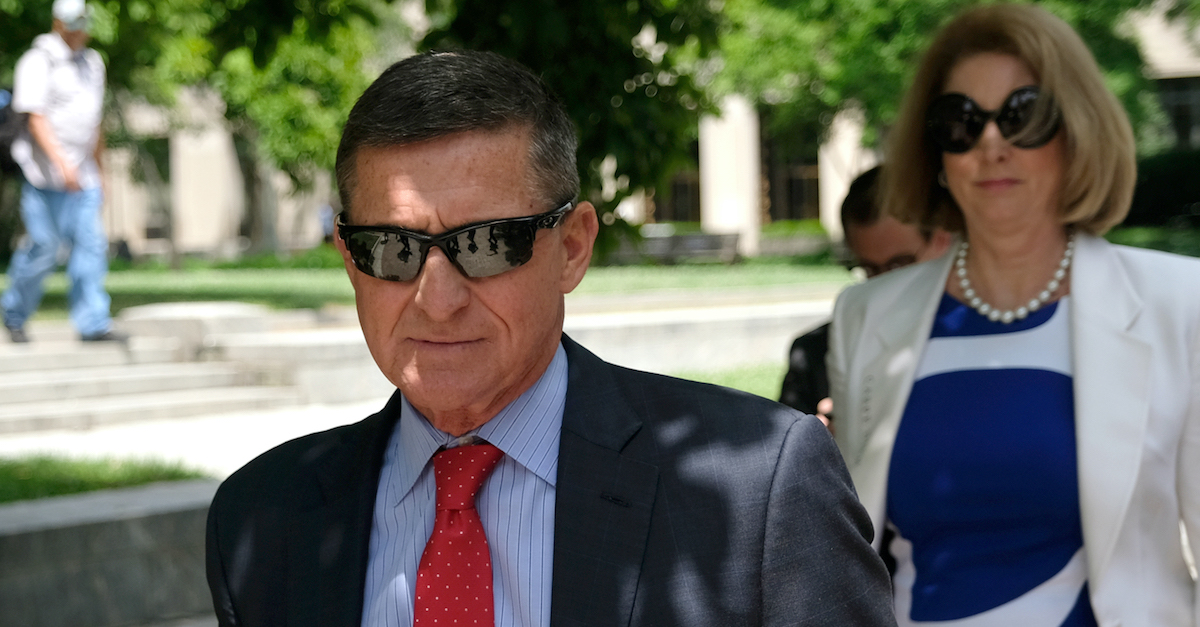
U.S. District Court Judge Emmet Sullivan on Wednesday, through his counsel, filed a reply brief with the U.S. Court of Appeals for the D.C. Circuit regarding whether that appeals court should force his hand in the case of Michael Flynn, President Donald Trump’s former National Security Advisor.
Sullivan’s legal rebuttal is best summarized as follows: the case is not yet ready for appellate review. (The judge’s original appellate brief on the matter was filed earlier in June., as was the DOJ’s.)
Flynn’s attorneys and the U.S. Department of Justice want the appeals court to basically force Sullivan grant the DOJ’s motion to drop the case completely. However, under federal procedural rules, such requests during this stage of the litigation (after a guilty plea but before sentencing) require “leave of the court,” which many roughly interpret to mean “permission.”
Sullivan wants to take a good, hard look at the case before granting the motion to vanquish the matter. Flynn and the DOJ, however, want the case dismissed quickly under the basic mantra that justice delayed is justice denied. The vehicle sought by Flynn and the DOJ to accomplish the dismissal is a “writ of mandamus,” which is an order from a court to a lower official—here, Judge Sullivan—which commands him to do his job properly.
Sullivan’s lawyers, headlined by Beth Wilkinson, wrote in the Wednesday filing that many of the other parties to the case are jumping the gun. They also argued that DOJ “barely mention[ed]” the D.C. Circuit’s “mandamus precedents.”
“Much of the briefing in this Court has focused on whether the government’s pending motion to dismiss must be granted,” Sullivan’s lawyers wrote. “But Judge Sullivan has not decided that motion. He has not yet received full briefing on that motion. And he has not had the opportunity to ask a single question about that motion. All he has done is put a process in place to aid his consideration of the issues it presents.”
“These facts require denying the petition” for mandamus, they added. “Mr. Flynn and the government, now joined in favor of mandamus, seek unprecedented relief: An extraordinary writ precluding a district court from even considering a motion that requires ‘leave of court’ before it can be granted, that raises open questions of law and unanswered questions of fact, and that would require dissolving multiple court orders. This Court’s mandamus precedents—which the government barely mentions—require denying that relief.”
Sullivan’s attorneys went on to argue that Sullivan should be allowed to cogitate upon and then rule upon on the underlying issues free from interference above:
That process makes particularly good sense in this case, because the incomplete record before this Court leaves key questions unanswered—such as whether the unusual facts here cast some doubt on the presumption of regularity for prosecutorial decisions, and the effect dismissal would have on Mr. Flynn’s statements about his work for Turkey, which were unrelated to the January 2017 FBI interview and not addressed in the government’s motion, but were part of his plea agreement and factual admissions.
Here’s the core argument Sullivan is making:
The Supreme Court suggested, and Congress approved, a version of Rule 48 that requires “leave of court” in all circumstances.
[ . . . ]
What is less clear is the scope of the district court’s discretion in conducting that inquiry. But that question is not properly before this Court . . . [a]nd the steps he has taken so far—appointing an amicus to ensure adversarial briefing, setting an expedited briefing schedule, and scheduling a hearing—are quintessential Article III functions that courts rely on to decide pending motions. After spending more than two years convincing the district court of Mr. Flynn’s crimes and enlisting its Article III power to convict him, it is not asking too much for the government and Mr. Flynn to participate in that process before the district court rules.
As suggested above, Sullivan’s attorneys zeroed in on Flynn’s work for Turkey as an alleged unregistered foreign agent. Flynn was not charged directly for those alleged acts; he pleaded guilty to lying to investigators and avoided deeper charges on the merits. Sullivan’s attorneys say the case must remain at the district court level to sort out how to handle those underlying accusations, which have become part of the record (internal citations and punctuation omitted):
Mr. Flynn admitted on multiple occasions to making materially false statements in Foreign Agent Registration Act (“FARA”) filings to the Department of Justice. The government previously asserted that Mr. Flynn could be prosecuted for these offenses, and Mr. Flynn’s plea agreement tolls the statute of limitations for them. While the Special Counsel’s Office promised not to further prosecute Mr. Flynn for that conduct, it did so only “in consideration of Mr. Flynn’s guilty plea,” which Mr. Flynn initially sought to withdraw but now oddly wants to keep in place.
READ the document filed by the judge’s attorneys below:
Flynn Sullivan Response by Law&Crime on Scribd
[Image via Alex Wroblewski/Getty Images.]
Have a tip we should know? [email protected]